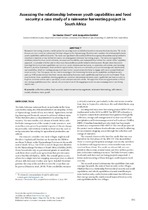| dc.contributor.author | Germaine, Owen | |
| dc.contributor.author | Goldin, Jacqueline | |
| dc.date.accessioned | 2021-09-10T11:33:36Z | |
| dc.date.available | 2021-09-10T11:33:36Z | |
| dc.date.issued | 2015 | |
| dc.identifier.citation | Owen, G., & Goldin, J. (2015). Assessing the relationship between youth capabilities and food security: A case study of a rainwater harvesting project in South Africa. Water SA, 41(4), 541–548. https://doi.org/10.4314/wsa.v41i4.14 | en_US |
| dc.identifier.issn | 0378-4738 | |
| dc.identifier.uri | 10.4314/wsa.v41i4.14 | |
| dc.identifier.uri | http://hdl.handle.net/10566/6643 | |
| dc.description.abstract | Rainwater harvesting presents a viable option for securing water availability in order to increase food production. The study focuses on rural youth in Luphisi and Dwaleni villages in the Mpumalanga Province and considers the relationship between youth capabilities and food security. The study uses qualitative data collected from focus group discussions and quantitative data from a baseline survey within the context of an integrated rainwater harvesting project. The indicators tapped into attributes related to trust, social cohesion, inclusion and sociability, and examined these within the context of the ‘capability approach’, to consider whether and in what ways these attributes can be linked to food security. Results show that youth have high levels of certain capabilities such as trust, social cohesion and inclusion, co-operation, self-esteem, and meaning. | en_US |
| dc.language.iso | en | en_US |
| dc.publisher | AJOL | en_US |
| dc.subject | Food security | en_US |
| dc.subject | Water resources management | en_US |
| dc.subject | Rainwater harvesting | en_US |
| dc.subject | Self-esteem | en_US |
| dc.subject | social cohesion | en_US |
| dc.subject | South Africa | en_US |
| dc.subject | Youth | en_US |
| dc.title | Assessing the relationship between youth capabilities and food security: A case study of a rainwater harvesting project in South Africa | en_US |
| dc.type | Article | en_US |

